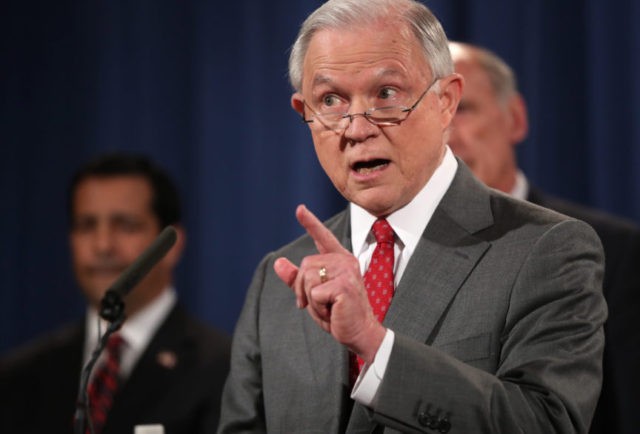In a whirlwind tour of speaking engagements this week, Attorney General Jeff Sessions continued hammering his Justice Department’s priorities, including pressuring so-called “sanctuary cities” and combating the opioid epidemic.
On Wednesday, Sessions continued to castigate local leaders who refuse to cooperate with federal immigration enforcement when he spoke at Portland Oregon’s U.S. Customs and Immigration field office. He called out Portland as one of the many jusisdictions whose law enforcement officers are bound by policy to ignore detainer requests and may not even notify ICE of the release of suspected illegal aliens they apprehend.
“Think about that,” Sessions said, “Police may be forced to release pedophiles, rapists, murderers, drug dealers, and arsonists back into the communities where they had no right to be in the first place. They should, according to law and common sense, be processed and deported.”
The remarks were a show of continued defiance after a federal judge in Chicago issued an injunction holding back certain aspects of Sessions’s Justice Department’s efforts to withhold grant money from sanctuary jurisdictions last week.
Sessions then spoke directly to the issue of liberal cities using the court system to prevent immigration cooperation conditions being placed on their grant money:
Yet, rather than reconsider their policies, these sanctuary jurisdictions feign outrage when they lose federal funds as a direct result of actions designed to nullify plain federal law. Some, including Portland, have even decided to sue this administration so that they can keep receiving taxpayer-funded grants while continuing to impede federal immigration enforcement.
“These grants are not an entitlement,” Sessions urged. “We strive to help state and local law enforcement. But we cannot continue giving such federal grants to cities that actively undermine the safety of federal law officers and actively frustrate efforts to reduce crime in their own cities.”
On the other side of country a day later, Sessions addressed another of his department’s priorities.
Speaking Thursday in Charleston, West Virginia, the heart of Appalachia and capital of the state with the highest opioid overdose rate in the country, Sessions touted new efforts to blunt the still rapidly expanding opioid crisis. “And I’m convinced this is a winnable war,” he told the crowd at the “West Virginia Rising” event put on by the American Conservative Union Foundation (ACUF) and the West Virginia think tank Cardinal Institute.
The address came on the heels of the attorney general announcing one of the largest ever seizures of drugs, including the synthetic opioids pushing overdose rates to all time highs, in San Diego, CA, Wednesday. To this tally, he added the take-down of the Alphabay online black market and the largest heath care fraud bust in history to the anti-drug successes of this tenure.
After running through, as he has before, the dire statistics of America’s ongoing demographic-scale opioid tragedy, Sessions related the facts-on-ground of this particularly hard-hit region in his prepared remarks, saying:
The top four counties in America for opioid overdose deaths – Wyoming, McDowell, Boone, and Mingo – are all in West Virginia, and six other counties in the state fall into the top 20. These trends are shocking and the numbers tell us a lot– but they aren’t just numbers. They represent moms and dads, brothers and sisters, neighbors and friends. They represent unique, irreplaceable people, and fellow Americans. They represent the 26-year-old pregnant mother who overdosed here in Charleston, accidentally killing both herself and her unborn child. They represent the couple who were found dead in their Kernville home a week after they had overdosed on heroin. Their five-month-old daughter was found with them—dead from starvation and dehydration.
Sessions went on to highlight the role of prescription pain killers in fueling addiction, pointing out West Virginia had more opioid prescriptions than people in 2015. He touted a new Opioid Fraud and Abuse Detection Unit, a “data analytics program” aimed at discovering “pill mill” medical practices at the heart of new opioid addictions, and the dispatch of a dozen additional federal prosecutors to opioid “hot-spots” like Southern West Virginia.
Later Thursday, Sessions is expected to be in Boston to address transnational criminal organizations like MS-13, and Friday he will travel to Philadelphia to further discuss the opioid crisis.

COMMENTS
Please let us know if you're having issues with commenting.